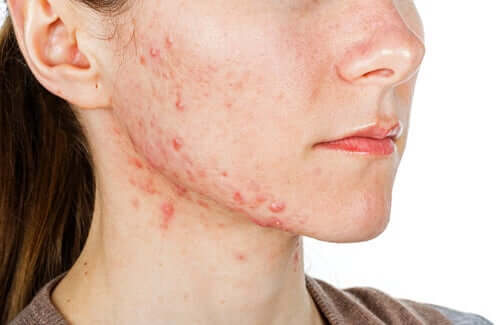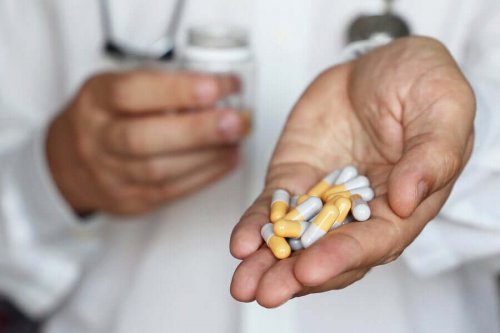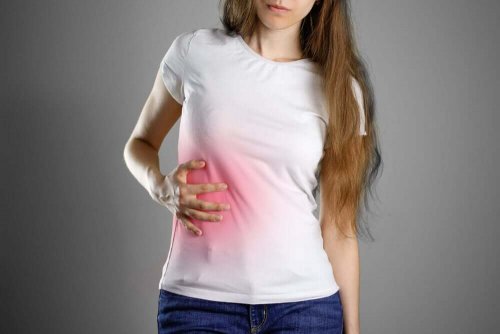Isotretinoin: Uses and Effects

Isotretinoin is a drug that belongs to the group of retinoids, derivatives of vitamin A, or retinoic acid.
It’s a drug prescribed for the treatment of cystic acne and severe acne. Therefore, it’s subject to medical prescription and special medical control.
How isotretinoin acts

Acne is a disease that depends on many factors. It manifests with obstruction and chronic inflammation of pilosebaceous follicles and alternates between periods of flare-ups and remission.
Although this drug’s mechanism of action isn’t entirely known, experts do know that it suppresses the activity of the glands that produce sebum and decreases their size.
Isotretinoin inhibits the proliferation of cells that produce sebum. Thus, it decreases sebum production and prevents bacteria from colonizing the ducts.
Uses of isotretinoin
This is the drug of choice for severe acne, cystic acne, and inflammatory acne when other treatments have failed. This is a systemic drug that doctors also indicate in cases of rosacea, hidradenitis suppurativa, and psoriasis.
How to take this medicine

There are different oral presentations. They consist of soft capsules that contain isotretinoin as the sole active ingredient and differ in dose and excipients.
It’s advisable to take the capsules with food. The medical professional adjusts the dose depending on the patient, as the response to the treatment and the manifestation of side effects depend on each case.
The recommended dose to begin treatment in adults is 0.5 mg/kg of weight every day. In patients with severe kidney failure, medical professionals indicate lower doses.
Long-term remission and relapse rates are related, especially with the total dose administered, rather than the duration of treatment. Overall, a treatment of 16 to 24 weeks is enough to achieve remission.
In most cases, the acne disappears completely with a single treatment. However, if a relapse occurs, the patient can opt for another treatment cycle with the same doses.
If it’s necessary to repeat the treatment, the patient should wait at least eight weeks, which is how long acne can continue to improve after treatment.
Contraindications

Isotretinoin is contraindicated in the following cases:
- Firstly, pregnant women or women of childbearing age. Studies show the teratogenic effect of retinoic acid and some of its analogues.
- Secondly, nursing mothers. Isotretinoin easily passes into breast milk. Due to the potential adverse effects for the mother and infant, its use is contraindicated in this case.
- Liver failure
- Hyperlipidemia
- Simultaneous treatment with tetracyclines. In these cases, there’s a risk of benign intracranial hypertension. Symptoms that may manifest include headache, nausea, vomiting, and visual disturbances.
- Hypervitaminosis A
- Finally, hypersensitivity to isotretinoin
If you’re being treated with isotretinoin, you should avoid sun exposure and always use a sunscreen with a high sun protection factor.
This article may also interest you: Cystic Acne: 6 Natural Remedies
Side effects
This drug has many side effects, which depend on the dose. They may manifest within a few days of starting treatment and include:
- Extremely dry skin
- Dry mucous membranes of the mouth, lips, and eyes
- Redness and peeling skin
- Muscle and joint pain
- In addition, elevated blood sugar and cholesterol levels
- Presence of blood or protein in the urine
- Likewise, thrombocytopenia, thrombocytosis, and neutropenia
- Elevated blood levels of triglycerides and liver enzymes
- Finally, headache, stomachache, and bone pain
During treatment, it isn’t recommended to use exfoliating skin treatments because there’s a risk of irritating the skin more and causing some kind of injury.
Conclusion
Medical professionals recommend isotretinoin to treat severe forms of acne, as isotretinoin helps reduce sebum production. For this reason, the results far outweigh the possible side effects it can cause.
https://mejorconsalud.as.com/isoface-usos-efectos/
All cited sources were thoroughly reviewed by our team to ensure their quality, reliability, currency, and validity. The bibliography of this article was considered reliable and of academic or scientific accuracy.
- Brenner, F. M., Rosas, F. M. B., Gadens, G. A., Sulzbach, M. L., Carvalho, V. G., & Tamashiro, V. (2006). Acne: um tratamento para cada paciente. Revista de Ciências Médicas.
- Caballero Jerez, D. M., & Moreno Moreno, A. M. (2016). Ojo seco en pacientes tratados con isotretinoína oral: revisión sistemática. https://repository.usta.edu.co/handle/11634/9482
- Gómez-Flores, M. (2011). Uso de isotretinoína en acné común. Revista Medica de México Seguro.
- Gricel, K., & Ortega, G. (2022). Trastornos psiquiátricos asociados al uso de isotretinoína en acné severo. Instituto Ecuatoriano de Seguridad Social Hospital. Riobamba, 2014-2019 (Tesis de licenciatura, Universidad Nocional de Chimborazo). http://dspace.unach.edu.ec/handle/51000/8906
- Ganceviciene, R. y Zouboulis, CC (2010). Isotretinoína: tratamiento de última generación para el acné vulgar. JDDG: Journal der Deutschen Dermatologischen Gesellschaft , 8 , S47-S59. https://onlinelibrary.wiley.com/doi/abs/10.1111/j.1610-0387.2009.07238.x
- Partera, J. A. (2012). Depresión y crisis de pánico en acné tratado con isotretinoína. SEMERGEN-Medicina de Familia, 38(3), 188-191. https://www.sciencedirect.com/science/article/abs/pii/S1138359311002887
- Vieira, A. S., Beijamini, V., & Melchiors, A. C. (2012). The effect of isotretinoin on triglycerides and liver aminotransferases. Anais Brasileiros de Dermatologia. https://doi.org/10.1590/s0365-05962012000300005
This text is provided for informational purposes only and does not replace consultation with a professional. If in doubt, consult your specialist.








